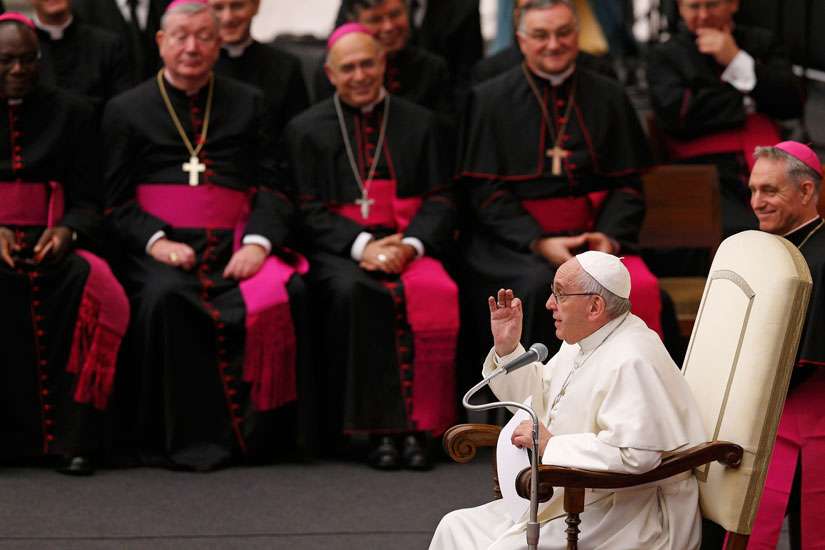The respective authority of Jesus and that of the Pharisees were the two poles around which the Pope’s homily revolved. The one was a real authority, the other was merely formal. The day’s Gospel speaks of the amazement of the people because Jesus taught “as one who has authority” and not like the scribes: they were the authorities of the people, the Pope said, but what they taught didn’t enter into their hearts, while Jesus had a real authority: He was not a “seducer,” He taught the Law “down to the last point,” He taught the Truth, but with authority.
Jesus served the people while the doctors of the law considered themselves princes
The Pope then entered into details, focusing on the three characteristics that distinguished the authority of Jesus from that of the doctors of the law. While Jesus “taught with humility,” and said to His disciples, “the greatest should be as one who serves: he should make himself small,” the Pharisees considered themselves princes:
Jesus served the people, He explained things because the people understood well: He was at the service of the people. He had an attitude of a servant, and this gave authority. On the other hand, these doctors of the law that the people… yes, they heard, they respected, but they didn’t feel that they had authority over them; these had a psychology of princes: ‘We are the masters, the princes, and we teach you. Not service: we command, you obey.’ And Jesus never passed Himself off like a prince: He was always the servant of all, and this is what gave Him authority.
The second characteristic of the authority of Jesus is closeness
It is being close to the people, in fact, that confers authority. Closeness, then, is the second characteristic that distinguishes the authority of Jesus from that of the Pharisees. “Jesus did not have an allergy to the people: touching the lepers, the sick, didn’t make Him shudder,” Pope Francis explained; while the Pharisees despised “the poor people, the ignorant,” they liked to walk about the piazzas, in nice clothing:
They were detached from the people, they were not close [to them]; Jesus was very close to the people, and this gave authority. Those detached people, these doctors, had a clericalist psychology: they taught with a clericalist authority – that’s clericalism. It is very pleasing to me when I read about the closeness to the people the Blessed Paul VI had; in number 48 of Evangelii nuntiandi one sees the heart of a pastor who is close [to the people]: that’s where you find the authority of the Pope, closeness. First, a servant, of service, of humility: the head is the one who serves, who turns everything upside down, like an iceberg. The summit of the iceberg is seen; Jesus, on the other hand, turns it upside down and the people are on top and he that commands is below, and gives commands from below. Second, closeness.
Jesus was coherent; the clericalist attitude is hypocritical
But there is a third point that distinguishes the authority of the scribes from that of Jesus, namely ‘coherence.’ Jesus “lived what He preached.” “There was something like a unity, a harmony between what He thought, felt, did.” Meanwhile, one who considers himself a prince has a “clericalist attitude” – that is, hypocritical – says one thing and does another:
On the other hand, this people was not coherent and their personality was divided on the point that Jesus counselled His disciples: ‘But, do what they tell you, but not what they do’: they said one thing and did another. Incoherence. They were incoherent. And the attitude Jesus uses of them so often is hypocritical. And it is understood that one who considers himself a prince, who has a clericalist attitude, who is a hypocrite, doesn’t have authority! He speaks the truth, but without authority. Jesus, on the other hand, who is humble, who is at the service of others, who is close, who does not despise the people, and who is coherent, has authority. And this is the authority that the people of God senses.
The amazement of the innkeeper in the parable of the Good Samaritan
In conclusion, the Pope, in order to make this better understood, recalled the parable of the Good Samaritan. Seeing the man left half-dead in the street by the robbers, the priest passed by, and kept on going, perhaps because there was blood and he thought that if he touched him, he would become impure. The Levite passed by and, the Pope said, “I believe that he thought” that if he got mixed up in the affair he would then have to go to court and give testimony, and he had many things to do. And so he, too, kept on going. Finally, the Samaritan came, and sinner, and he, instead, had mercy. But there was another person in the parable, Pope Francis noted: the innkeeper, who was amazed, not because of the assault of the robbers, because that was something that happened along that road; not because of the behaviour of the priest and the Levite, because he knew them; but because of the behaviour of the Samaritan. The amazement of the innkeeper at the Samaritan: “But this is crazy… He’s not Jew, he’s a sinner,” he could have thought. Pope Francis than connected this amazement to the amazement felt by the people in the day’s Gospel in the face of Jesus’ authority: “a humble authority, of service… an authority close to the people” and “coherent.”


